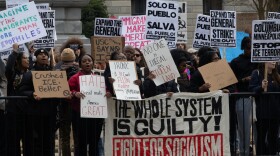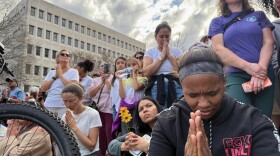-
On this episode of the South Carolina Lede for February 17, 2026: we sit down with Senate Minority Brad Hutto and House Minority Leader Todd Rutherford about the legislative session so far and what they hope to accomplish in a Republican supermajority Statehouse; two big national Democrats are heading to the Palmetto State later this month; and more!
-
Some 200 people rallied outside the Statehouse in Columbia Friday to lead a protest against U.S. Immigration and Customs Enforcement activity.
-
The monks entered the state Jan. 6 and have walked through municipalities like McCormick, Edgefield and Saluda. The group trekked from Lexington to Columbia Jan. 10 on Day 77 of the 120-day, 2,300-mile journey to the nation's capital city.
-
On this episode of the South Carolina Lede for January 10, 2026: our special live Lede taping from this week featuring House Speaker Murrell Smith; we also hear from Statehouse reporter Maayan Schechter as we preview the 2026 legislative session; we discuss the key issues that are expected to shape South Carolina; and more!
-
More than 200 citizens met outside the Statehouse in the Palmetto State's capital city to protest. Signs that read "ICE out of our communities" filled the sidewalk next to the South Carolina Confederate Monument.
-
The Republican nominee vying to represent a Lexington County seat in the South Carolina House will be John Lastinger after the pastor won a GOP runoff Nov. 4, according to unofficial election results.
-
COLUMBIA, S.C. (AP) — A Republican lawmaker in South Carolina has resigned from the House while awaiting trial on charges of distributing child sexual abuse material. RJ May's resignation letter, dated Thursday, reached House leadership on Monday. May was elected in 2020. His replacement could be chosen in a special election before the 2026 session.
-
The statehouse passed liquor liability reform to the benefit of our state’s hospitality industry and income tax reform is halfway through the legislature.
-
The statehouse passed liquor liability reform to the benefit of our state’s hospitality industry and income tax reform is halfway through the legislature.
-
On this episode of the South Carolina Lede for May 10, 2025: a wrap up of the first year of the 2 year legislative session!

Play Live Radio
Next Up:
0:00
0:00
Available On Air Stations









